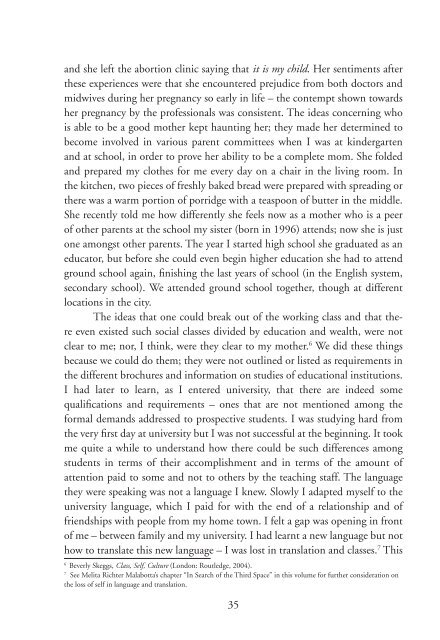Teaching Subjectivity. Travelling Selves for Feminist ... - MailChimp
Teaching Subjectivity. Travelling Selves for Feminist ... - MailChimp
Teaching Subjectivity. Travelling Selves for Feminist ... - MailChimp
You also want an ePaper? Increase the reach of your titles
YUMPU automatically turns print PDFs into web optimized ePapers that Google loves.
and she left the abortion clinic saying that it is my child. Her sentiments after<br />
these experiences were that she encountered prejudice from both doctors and<br />
midwives during her pregnancy so early in life – the contempt shown towards<br />
her pregnancy by the professionals was consistent. The ideas concerning who<br />
is able to be a good mother kept haunting her; they made her determined to<br />
become involved in various parent committees when I was at kindergarten<br />
and at school, in order to prove her ability to be a complete mom. She folded<br />
and prepared my clothes <strong>for</strong> me every day on a chair in the living room. In<br />
the kitchen, two pieces of freshly baked bread were prepared with spreading or<br />
there was a warm portion of porridge with a teaspoon of butter in the middle.<br />
She recently told me how differently she feels now as a mother who is a peer<br />
of other parents at the school my sister (born in 1996) attends; now she is just<br />
one amongst other parents. The year I started high school she graduated as an<br />
educator, but be<strong>for</strong>e she could even begin higher education she had to attend<br />
ground school again, finishing the last years of school (in the English system,<br />
secondary school). We attended ground school together, though at different<br />
locations in the city.<br />
The ideas that one could break out of the working class and that there<br />
even existed such social classes divided by education and wealth, were not<br />
clear to me; nor, I think, were they clear to my mother. 6 We did these things<br />
because we could do them; they were not outlined or listed as requirements in<br />
the different brochures and in<strong>for</strong>mation on studies of educational institutions.<br />
I had later to learn, as I entered university, that there are indeed some<br />
qualifications and requirements – ones that are not mentioned among the<br />
<strong>for</strong>mal demands addressed to prospective students. I was studying hard from<br />
the very first day at university but I was not successful at the beginning. It took<br />
me quite a while to understand how there could be such differences among<br />
students in terms of their accomplishment and in terms of the amount of<br />
attention paid to some and not to others by the teaching staff. The language<br />
they were speaking was not a language I knew. Slowly I adapted myself to the<br />
university language, which I paid <strong>for</strong> with the end of a relationship and of<br />
friendships with people from my home town. I felt a gap was opening in front<br />
of me – between family and my university. I had learnt a new language but not<br />
how to translate this new language – I was lost in translation and classes. 7 This<br />
6<br />
Beverly Skeggs, Class, Self, Culture (London: Routledge, 2004).<br />
7<br />
See Melita Richter Malabotta’s chapter “In Search of the Third Space” in this volume <strong>for</strong> further consideration on<br />
the loss of self in language and translation.<br />
35

















